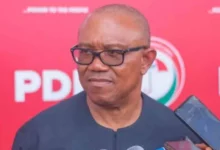Labour, experts fault Tinubu’s N8,000 transfer to poor families

The organised labour and some economists have faulted the plan by the Federal Government to transfer N8,000 into the accounts of 12 million vulnerable and poor Nigerians over the next six months to cushion the effects of the removal of subsidy on Premium Motor Spirit, popularly known as petrol.
The Senate had on Thursday approved the request of President Bola Tinubu to borrow $800m loan from the World Bank. It also amended the 2022 Supplementary Appropriation Act to accommodate the provision for N500bn for palliatives to mitigate the effect of petrol subsidy removal on poor Nigeria
The President requested the two approvals in separate letters read by the Senate President, Godswill Akpabio, at the plenary.
According to Tinubu, the $800m loan will be used to cater for the welfare of the vulnerable and poor households in the country under the National Safety Net Programme, while the sum of N8,000 will be transferred monthly to the bank accounts of 12 million poor and low income households for six months.
There is unease in many states of the federation as the effects of the removal of subsidy keep biting Nigerians harder as rising costs of living and commuting have thrown a lot of households into poverty.
It will be recalled that the President announced the end to subsidy payment to fuel importers and marketers at his inauguration on May 29, 2023.
As a result of the announcement, the pump price of petrol was immediately increased by marketers to N500 per litre from N185 with the attendant rise in the cost of transportation, food and other goods and services.
Following threat by the organised labour to embark on a nationwide strike, the Federal Government rallied labour unions and a committee was set up to work out appropriate palliatives. The panel has yet to submit its report although the Trade Union Congress of Nigeria proposed N200,000 as the national minimum wage instead of the current N30,000 to cushion the effect of subsidy removal on workers.
The Chairman, Nigeria Labour Congress, Lagos chapter, Mrs Funmi Sessi, said the Federal Government’s plan was like a drop of water in the ocean.
Sessi spoke with the News Agency of Nigeria in Lagos on Friday, as stakeholders in the sector reacted to the government’s plan.
The President had in a request to the National Assembly indicated the intention of his administration to cater for the welfare of the vulnerable and poor households in the country under the National Safety Net Programme.
He said under the plan, the sum of N8,000 would be transferred digitally on a monthly basis to the accounts of 12 million poor and low income households for six months.
The money is expected to stimulate economic activities in the informal sector and improve the standard of living in the beneficiaries’ households.
Sessi said, “Looking at the money and the effect of the subsidy removal that has escalated the prices of everything in the market, I wonder what the N8,000 can do for a family in a month.
“I wonder what it can buy and the services it can render for 30 days; N8,000 cannot take care of a family for a week; it is not possible; it is going to be like a drop of water in the ocean.
“We do not know how the government is going to get clarity for those who will require it the most; how it will identify those who are most affected, and how the palliatives will get to those actually in need.
“Labour is asking for a pay rise; for those in abject poverty, we believe the government can do better for them.”
The labour leader, however, urged the President to instead provide facilities and infrastructure to make Nigerians independent to be able to provide for themselves and their families.
“It should profile those who want to do various agricultural activities, give them the resources and mobilise them, so that they can also become employers of labour,” she added.
The President, Association of Senior Staff of Banks, Insurance and Financial Institutions, Mr Oluwole Olusoji, said the move was a repeat of the same old process that did not add real value.
He stated, “What people need is not cash handout, but subsidised quality of service.
“Subsidised education up to a specified level; access to quality subsidised health services (free for children and established indigent families); subsidised government-managed transportation and efficient infrastructure (power, roads and communication) will add better value.”
The National Deputy President, Trade Union Congress of Nigeria, Mr Tommy Okon, also spoke on the issue.
He said it would be proper to allow the presidential committee on removal of oil subsidy to conclude its report and arrive at collective agreement with the organised labour before embarking on any palliative care distribution.
“Otherwise, it will amount to doing exactly what the previous administration did that yielded no positive impact on the environment and economy,” he noted.
Economists fault plan
On his part, a professor of Economics and Public Policy at the University of Uyo, Akwa Ibom State, Akpan Ekpo, harped on the fact that the conditional cash transfer would not solve the problems of poverty, but rather an investment in infrastructure through the provision of a good transport system, quality education, quality healthcare services and decent social housing would better impact the populace.
“If tomorrow, we solve our power problem, if we have 18 hours of uninterrupted power supply, it will go a long way to help those who are small business owners. It’s better than givng people N8,000 for six months or one year. I hope that’s not what they are thinking. The last administration gave people N5,000 to sell pepper, but it didn’t work. The best thing is to invest the money in hard and soft infrastructure, and to maintain the infrastructure over time,” he said.
Ekpo argued that there was no comprehensive data system in the country that would reveal the actual individuals that had such needs.
“We do not have the data that will show us those that need the funds. We have some data in terms of household poverty as compiled by the Ministry of Humanitarian Affairs, but that’s not enough because you need comprehensive data, well organised into different categories and structures as to who needs the palliative,” he added.
An economist, Johnson Chukwu, said there were several alternative options the Federal Government could adopt rather than distributing money.
He added that there was a need for the government to have a proper register of the citizens, noting that the N8,000 was too meagre to have any effect on the beneficiaries.
Chukwu stated, “The palliative is not meant to be a sustainable measure. It is supposed to be an ad hoc measure to cushion the impact of subsidy removal. It is not something that the government can sustain. I think it is not meant to be a continuous handout, but an intervention.
“There are several options, which the Federal Government has to choose the most appropriate to implement. The key question is do they have a proper register and what impact will N8,000 actually have on the people? ”
A professor of Monetary Economics, Olusegun Ajibola, explained that the decision taken by the government was to lessen the effect of the hardships faced by individuals.
According to him, such a palliative is not meant to be sustainable and should be considered as a temporary measure.
States’ plans
Some states announced immediate measures to deal with the situation, including reducing the number of days in which workers would come to their respective offices to three days from the usual five, while others unveiled plans to buy more mass transit buses for use by the workers.
The NLC has, however, advised the governors, who have yet to provide palliatives for workers, to emulate their colleagues who have done so.
The advice followed findings by Saturday PUNCH that many state governments were not showing interest in assuaging the hardship facing the citizens in the aftermath of the fuel subsidy removal.
The National Treasurer of the NLC, Hakeem Ambali, said, “State relief packages should have been rolled out immediately after President Tinubu’s announcement of the removal of fuel subsidy. Some states that really have the interest of their people at heart immediately rolled out palliatives. We, therefore, call on the other states to join the queue.”
Speaking further on negotiations with state governors as regards the minimum wage, the NLC official noted, “Once we finish negotiations at the national level, we shall direct state councils to embark on state-level negotiations.”
Katsina
Over six weeks after the removal of the fuel subsidy, the Katsina State Government has yet to implement any programmes to cushion the economic impact on the citizens.
Sources, however, claimed that Governor Dikko Radda might announce the palliative measures when he returns to the state from a trip.
A source said, “You know his Excellency already directed that the Katsina State Transport Company should not increase transport fares on all the routes. More palliatives are on the way and I know he will make them public once he returns to Katsina.”
The Director-General in charge of the media, Maiwada Dammalam, could not be reached for comments.



